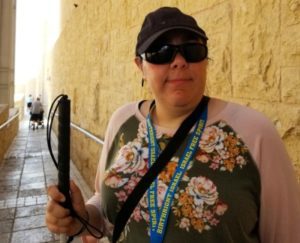By Jenny Rapp
It wasn’t the typical first trip to Israel for Nechama Zakroff, 24, who went on a different sort of Birthright trip this summer. “YALLA,” an organization that helps people with disabilities, partnered with Birthright together with OU Israel Free Spirit for its second group trip to Israel for people with physical handicaps that make it difficult for them to travel.
The group included 19 participants with 21 staff members who were trained in first aid and CPR.
Zakroff, a graduate of George Washington High School and Bais Yakkov of Denver, and two other participants are visually impaired; there were two sisters with cystic fibrosis and some participants are paraplegic, among other disabilities.
“They had anything and everything,” Zakroff says, describing all the equipment and preparation the staff had for any possible situation. They had wheelchairs, medications, shower chairs and even cold vests to keep the girls with cystic fibrosis from overheating.
They went touring all over Israel, from jeeping in the Golan to ziplining at Etgarim Challenge, using a ropes course with special harnesses designed specifically for people confined to wheelchairs.
Her trip to the burial site of Rabbi Shimon Bar Yochai in Meron in Northern Israel was especially powerful.
One of the other visually impaired participants was having one of the staff members read Psalms out loud with her, as it is traditional to pray when visiting burial sites in Israel.
“As they were doing it some other ladies around them joined in,” Zackroff recounts, “so that was really beautiful to hear.”
Zakroff says she thinks her experience in Israel was different from other people’s because she couldn’t see the sights. She had to visualize them in other ways.
“I’m doing it through touch, hearing and all sorts of other senses,” she says.
Her tour guide found 3D models of different parts of Israel so she was able to touch them and feel the lay of the land.
“Also my tour guide found some different plants for us to touch,” she says, like a pomegranate, olives and dates, all of which are part of the biblical Seven Species native to Israel.
“Really, there were times that I wish I could have seen certain things,” she says.
For example, the 3D model of the Beit Hamikdash, or Holy Temple, in the Israel Museum was fenced off so she couldn’t touch it. “It would have been nice to see, and I wish I would be able to see the land a little more clearly.”
Then there were the parts of Israel that she appreciated especially because of her inability to see them. “I appreciated just being in Israel, being able to explore and doing it my own way a little bit,” she says, “just to be able to feel and touch . . . and to be able to hear the beautiful sounds of Israel.”
The sound of Israel, she says, is a mixture between the Mediterranean Sea, the Dead Sea, people talking in Hebrew, the sirens heralding the onset of Shabbat on Friday afternoon and even the announcements telling her where to go.
She says that while she was in Israel, despite not being able to see the land, she felt the holiness. “It was like a whole awakening, a spiritual feeling.” Though there is, for her, a tinge of the bittersweet. “It’s just so sad,” she says, “because not everything is ours in Israel and you’re just hoping one day it will be ours again.”
“It was a really nice group everyone was so fabulous,” Zakroff says, “I totally recommend it to anyone who wants to go on a trip and has a disability.”
Copyright © 2019 by the Intermountain Jewish News

















